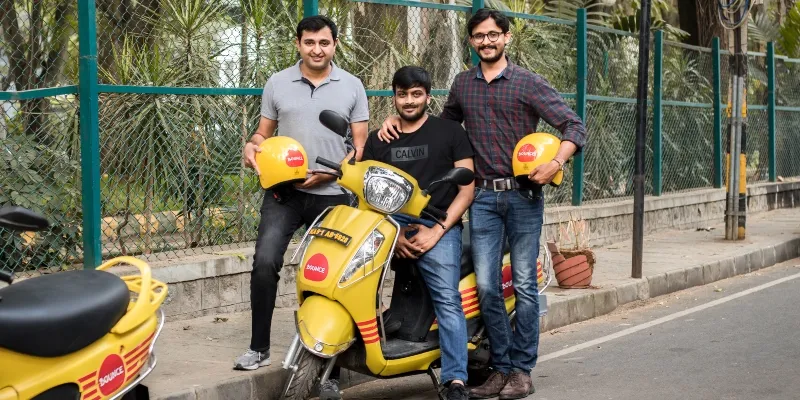[Funding alert] Bounce raises $72 M in Series C round led by B Capital and Falcon Edge
The Bengaluru-based dockless ride-hailing startup has raised $72 million in Series C funding led by B-Capital and Falcon Edge, the investment firm founded by Facebook's co-founder Eduardo Saverin. The team aims to touch one million rides a day.
Dockless ride-hailing startup Bounce (previously Metro Bikes) on Monday announced that it has raised $72 million in Series C funding led by Eduardo Saverin's B Capital, Falcon Edge, Accel Growth Fund, Maverick, and Qualcomm. Existing investor Sequoia Capital, IDG, Omidyar, and Accel Partners too invested in this round.
According to its RoC filings, Bounce revenues grew to Rs 5.4 crore in FY 2017-18 from Rs 4.3 crore in the previous fiscal. For the same period, losses widened from Rs 3.2 crore to Rs 7 crore. Bounce also acquired the India assets of the Chinese cycle sharing company, Ofo, last year.
The team had also raised debt capital of approximately $4 million from Flipkart Co-founder Sachin Bansal’s new fund, BAC Acquisitions.

(L-R) Varun G, HR Vivekananda and Anil G
Speaking to YourStory on the funding, HR Vivekananda, (known as Vivek) Co-founder Bounce, said,
"With this round of funding, we aim to touch one million daily rides. The funding will also be used to further scale our teams, technology, and supply."
Bounce scooters are mostly found parked outside Namma Metro stations in Bengaluru. For commuters in Bengaluru, as with those in the 11 other cities that Bounce operates in, these daily commute bikes are an answer to their last-mile woes.
The key-less scooters allow users the convenience of picking up a bike from anywhere through its app and dropping it at any location once they reach their destination.

Vivekananda, Varun Agni and Anil G - Founders of Bounce
Today, the company’s fleet of docked and dockless scooters consists of more than 8,000 scooters, of which 3,500 are dockless bikes. It has clocked over 2.2 million rides in the last two months, and Vivek says they will soon touch a million rides every month.
The journey began in 2014 when Vivek, Varun Agni, and Anil G founded Wicked Ride, a premium bike rental platform. The idea to start Wicked Ride came to them when Anil had to wait 12 months for a Royal Enfield after placing his order for one.
“The idea of Bounce came when the first part of the metro line opened in Bengaluru in 2016. We wondered if it would transform commuting in the city. We realised that if we wanted to address mobility at large, we needed to look at the Point A-to-B commute,” says Vivek.
Currently, the reason last and first-mile commute is a challenge in India is because infrastructure development in the country is not moving at the same pace as urbanisation, especially in the top five metros, says Vivek.
To address this challenge, the team looked at different modes of transport - cars, two-wheelers, and cycles. They chose two-wheelers, as it seemed like the natural choice.
“We realised bikes would have the easiest transition, considering India has the highest two-wheeler owning population,” says Vivek.
The team started by using revenues generated from Wicked Ride to assemble a fleet of 20 scooters. They also raised a grant of Rs 12 lakh from the Toyota Mobility Foundation, which helped them create a simulation experiment at the Byapannahalli Metro station in eastern Bengaluru.
Vivek says the team then began working with people on the ground to offer this service: one person would hand over the bike keys, get the user to sign paper documentation, and then hand over the bikes. They also worked with people in the near-adjacent suburb of Whitefield to collect the keys and bikes.
In August 2018, the team raised equity funding from Sequoia Capital and Accel Partners.
“What was a proud moment for us was that both the investors had invested in India and us before their US counterparts invested in the scooter sharing company, Bird,” says Vivek.
Bounce's current bike-rental pricing -- Rs 5 per kilometre and Rs 0.5 per minute -- makes it one of the most cost-effective commute option for users. It's even cheaper than travelling in an auto-rickshaw.
The company's pricing model works like this: the cost of petrol works out to Rs 1.75 to Rs 2 per km and maintenance to Rs 1.5 per km. This works out to over Rs 4 per km. If you charge anything above that, you start making Re 1 for every kilometre.
However, the team can further reduce this cost, and that is where electric vehicles (EVs) come into the picture. The cost of electricity significantly pulls down the overall price to Rs 0.5 per km, which means the consumer can be charged Rs 3 per kilometre and still allow Bounce to make money.
The intention is to expand Bounce’s network across Bengaluru and develop a pan-India presence by 2020. The team also aims to use the funding to invest in a stronger delivery model through innovations in technology.


![[Funding alert] Bounce raises $72 M in Series C round led by B Capital and Falcon Edge](https://images.yourstory.com/cs/2/a9efa9c0-2dd9-11e9-adc5-2d913c55075e/Founding_Team_Bounce1560843458267.jpg?mode=crop&crop=faces&ar=2%3A1&format=auto&w=1920&q=75)
![[Funding alert] After investing in Vogo, Sachin Bansal lends bike-rental platform Bounce $4M](https://images.yourstory.com/cs/2/a9efa9c0-2dd9-11e9-adc5-2d913c55075e/Metro-Bikes1553876942473.jpg?fm=png&auto=format&h=100&w=100&crop=entropy&fit=crop)





